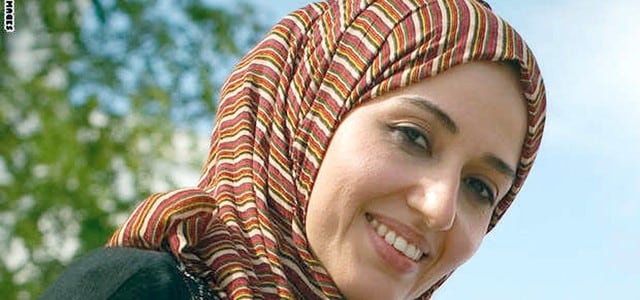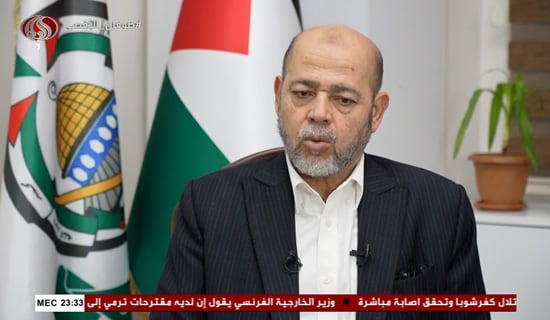Sumaya Al-Ghannouchi, a Tunisian journalist and Middle East affairs expert living in France and the daughter of Rachid Al-Ghannouchi, the leader of the Ennahdha movement in Tunisia,[1] published a scathing criticism of the attitude of Saudi Arabia, and Saudi clerics, to the various streams of Islam such as the Muslim Brotherhood.
Saudi Arabia, she wrote, is an "absolutist country" whose clerics have become "some type of religious clerks" providing justification for the double standards of Saudi policy. For example, she described how clerics have published numerous rulings against infidels, while during the Second Gulf War, when Saudi Arabia invited the armies of the U.S. and the West onto its soil, these same scholars published rulings permitting assistance from infidel armies.
Al-Ghannouchi noted that in the past, Saudi Arabia had cooperated with various streams of Islam, including the Muslim Brotherhood, when doing so suited it needs – such as during the confrontation with communism, and with Nasserism. However, she noted, with the advent of the Arab Spring, Saudi Arabia had started to become hostile to these streams, due to their desire to integrate Islam with democracy, and their rise to power in various countries by means of democratic elections.
She stated defiantly that the Saudi regime, which is currently battling Al-Qaeda and the Islamic State (ISIS), should be the last to complain about the extremism of some branches of Islam, since this extremism had emerged from the soil of the Wahhabi ideology, whose roots are in Saudi Arabia.
According to Al-Ghannouchi, branches of Islam such as the Muslim Brotherhood originated in an open and liberal environment and among the educated classes in the research institutes and at the modern universities, becoming more extreme following the 1960s and '70s due to the influence of Salafi-jihadism, This absolute turning point in Saudi policy against these branches of Islam, she added, provides them with a golden opportunity to distance themselves from Salafi Islam and return to their liberal and reformist roots. She adds that many – her father Sheikh Rachid Al-Ghannouchi among them – would not accept her position, although in her opinion it is the direction that the Islamic world as a whole, and the Arabs in particular, must take.

Sumaya Al-Ghannouchi (sasapost.com, August 6, 2016)
The following are excerpts from her article:[2]
"Although It Is Customary To Think Of Saudi Arabia As A Completely Religious Country, In Fact... It Is An Absolutist Country"
"Every day, more and more evidence emerges that Saudi Arabia has erred and is about to entangle itself in positions and policies that are not to its benefit. This country, which contains the sites holy to Muslims and is the direction to which they pray, has based its legitimacy on religion, and is one of the few countries in the world that lacks a constitution, claiming that it derives [its legitimacy] directly from the Sharia, the Quran, and the Sunna. Also, it is not restricted in any way and there is no oversight of its government, the argument being that the ruler has the right to absolute fidelity and obedience from the citizens. This is the way it has worked for many decades.
"Although it is customary to think of Saudi Arabia as a completely religious country, in fact the description closest to reality is that it is an absolutist country,[3] whose leaders rule over both [its] material and spiritual spheres. In other words, they influence the resources and the religion and everything else. With the establishment [of the country], the connection [between the material and the spiritual] was established as a kind of interpersonal covenant between the people of the sword and the people of religious da'wa [Islamic preaching] – except that [this covenant] gradually started to be transgressed in favor of governance by the sword, to the detriment of the people of da'wa, and over time Saudi Arabia's clerics became some type of official religious clerks and nothing more, who receive salaries and pensions from the state in accordance with the extent to which they are needed and the forces of supply and demand.
"The Saudi clerics excelled at targeting the fight against the infidels, the polytheists, and those who deviate from the straight path, but when, during the Second Gulf War, Saudi Arabia invited the armies of the U.S. and the West onto Muslim [i.e. its own] land, the clerics were compelled to issue fatwas dealing with 'permitting the acceptance of the assistance of infidel armies.'"
SUPPORT OUR WORK

"Saudi Arabia Tried To Establish A Kind Of Practical Alliance With The Various Streams Of Islam, Especially With The Muslim Brotherhood"
"In the framework of contending with the spread of the left wing and Nasserism, Saudi Arabia tried to establish a kind of practical alliance with the various streams of Islam, especially with the Muslim Brotherhood. The late king Faisal [bin Abd Al-Aziz, who ruled from 1964 to 1975] groomed several leaders of the Muslim Brotherhood during the period of his dispute with [then-Egyptian president Gamal] Abd Al-Nasser. Later, Saudi Arabia signed an agreement with Pakistan, under the auspices of the U.S., and [along with Pakistan] assisted the Afghan fighters with money and arms in their confrontation with what was then known as the Communist Empire of Evil [the USSR].
"That is how the Saudi connection with the various branches of Islam continued to develop, starting with an alliance or at least a substantive coming together [of interests] in the face of communism, and continuing [in its current efforts] to restrain the Iranian Shi'ite expansion. The new development in this arena was that, due to a pathological, obsessive fear of the Arab Spring revolutions, during the reign of King Abdullah [bin Abd Al-Aziz, who ruled from 2005 to 2015], Saudi Arabia assumed a hostile stance toward these branches of Islam... not because they were Islamic, but because their world view was based on the principle of harmony between Islam and democracy, and had advanced toward the thrones in more than one country, on the basis of the legitimacy of elections. Saudi Arabia viewed this as one of the most severe political sins that it could not abide, while Saudi Arabia itself had based the legitimacy of its rule on the claim of the application of Sharia and direct subordination to Islamic Law, to the Quran, and the Sunna, and then later [appropriated] exclusive control over Sunni Islam."
Saudi Arabia Runs A "Holy Campaign... Against Al-Qaeda And The Islamic State... After They Came Out Against The Country... [And] Against Iran And The Shi'ite Branches... [And] Against The Muslim Brotherhood"
"This is how Saudi Arabia runs its holy campaign today, on numerous religious fronts: a campaign against Al-Qaeda and the Islamic State, [both of] which were cultivated in the Wahhabi incubator, after they came out against the country, and translated into deeds the practice of takfir [accusing other Muslims of heresy] and the tendency to extremism that are inherent and anchored in Wahhabism. The second front faces off against Iran and the Shi'ite branches in the Gulf and the entire area; and last but not least comes the campaign against the Muslim Brotherhood, and here the reference is to those forces of Islam that advocate 'wasatiyya' ['the middle path'], and who do not share Saudi Arabia's path or outlook.
"Several days ago, the [Saudi] Council of Senior Scholars published a fatwa on the subject of the Muslim Brotherhood, which was tailored exactly to its [the Muslim Brotherhood's] measurements, and that precisely meets the needs of the Saudi campaign [against it], led by [Abu Dhabi Crown Prince] Muhammad bin Zayed. The essence of this fatwa is that the Muslim Brotherhood has nothing to do with [religious] belief, nor its correction, and that its path is false and corrupt and founded on rebellion against the state.[4]
"A person may disagree with the Muslim Brotherhood about many things, or appreciate its experience, but when it comes to an element [i.e. the Council of Senior Scholars] that directs criticism or, more accurately, makes accusations, then certain things must be said: The Saudi religious establishment, with its very foundation grounded in the Wahhabi ideology, should be the last to talk about extremism. In fact, it is a living example of religious extremism and alienation from modernism, and is the closest thing to a council of cardinals, whose purpose does not extend beyond providing religious support for political decisions and issuing religious rulings in accordance with the instructions that it receives.
"The [Saudi] ruling accuses the Muslim Brotherhood [organization] of not being concerned with correcting the faith, so that the implication is that it is the Council of Senior Scholars that represents and preserves proper and steadfast belief, and that everything else is a deviation from the path of righteousness and is polytheism – Heaven help us! This ruling opposes the way of takfir, which is rooted in the ideology of Wahhabism that they [the Council of Senior Scholars] represent, and they have started to tilt at windmills, i.e. to fight on the wrong fronts, and are thus delivering a critical blow to the image of Islam. They have transformed Islam into a symbol of the oppression of women and expropriation of their rights, including the simple right of driving a car. They have transformed Islam into a synonym for political backwardness, by legitimizing absolute obedience to a ruler in the absence of a constitution or binding laws, of elections, of an independent judiciary system, or anything else. This is the height of corruption of religion and belief."
"With Respect To The Principle Of Rebelling Against A Ruler... Wahhabism... Was The First To Rebel Against The Ottoman Turks After Accusing Them Of Heresy And Denouncing Them"
"With respect to the principle of rebelling against a ruler, it was Wahhabism that was the first to rebel against the Ottoman Turks after accusing them of heresy and denouncing them, when they were waging wars of attrition against the European countries... The germ of accusing the other of heresy and of armed rebellion is rooted in Wahhabi thought from even before Wahhabism became an official ideology in the service of the state. [Meanwhile,] the idea of rebelling against a ruler faded away, since the ruler's sword hung over the heads of those deprived of power – while the battle over faith continues to rage, on the claim that [the Saudi regime] represents the faith of the first generations of Islam ,while the other streams of Islam are apostate... [In the opinion of the Council of Senior Scholars,] these battles are permitted, and they even recommended that they [these battles] be waged indefinitely, since [not only] do they cost nothing, [but] they keep them [the Saudis] occupied tilting at windmills.
"In essence, despite the circumstantial dangers inherent in separating the Wahhabist positions from those of the [other] Islamic streams today and encouraging the differences between them, this separation and encouragement actually comprises a commendable and desirable trend, whose advantages far outweigh its damages, first and foremost in the aspiration to shed the legacy of extremist Salafism...
"This relationship – which is politically calculated – between Saudi Arabia and the Sunni Islamic streams has had extremely negative consequences, as manifested in the fact that these movements turned to religious extremism and have been imprinted with the hue of Wahhabi Salafism, to the extent that in the framework of what was known as Al-Sahwa Al-Islamiyya[5] [Islamic Awakening], the lines separating the political streams of Islam from Wahhabi Salafism were gradually blurred. This was clearly shown by the tendency to extremism toward women and [toward] freedom of thought and conscience, and in light of the spread of the Salafi dress code that the religion [according to those abiding by this dress code] is summed up as a long shift, a beard, and a stick of anise, as well as keen interest in ethnic conflicts, and an interest in [religious] texts at the expense of reality, and in form rather than content."
"This Absolute Turning Point In Saudi Policy [Against The Islamic Streams] Grants These Islamic Streams A Golden Opportunity To Distance Themselves Clearly And Completely From Salafist Islam"
"Despite the fact that the Sunni Islamic stream in the shape of the Muslim Brotherhood first originated in an open and liberal environment and among the educated classes in the [research] institutes and at the modern universities, it was the following generations of [branches] of Islam, since the 1960s and 1970s, that were taken by the madness of Wahhabi Salafism, which penetrated [their ideology] to the point where the two merged.
"This absolute turning point in Saudi policy [against the Islamic streams] grants these Islamic streams a golden opportunity to distance themselves clearly and completely from Salafist Islam, and to return to the place from whence the reformist movement's legacy blossomed, with Jamal Al-Din Al-Afghani, Muhammad Abduh, Muhammad Rashid Rida,[6] and others who were among the pioneers of Islamic reform.
"Of course, many – among them my father Sheikh Rashid Al-Ghannouchi – would not agree to assume a position like that [which I have expressed in this article]. On the contrary, it is likely that it would be met with great reservations. However, in my opinion, this is the most appropriate and correct position, if the enlightened Islamists want to free themselves from many of the intellectual and political fetters. This is the future direction that is needed for the Islamic world in general and for the Arabs in particular. "
[1] Rachid Al-Ghannouchi is a Tunisian Islamic politician and intellectual and leader of the Islamic Ennahdha movement. He was exiled from Tunisia in the early1990s, lived in London for 20 years, and returned to Tunisia in 2011 following the Arab Spring.
[2] Sasapost.com, (June 23, 2017).
[3] Political absolutism (or absolute monarchy) is the political doctrine and practice of unlimited, centralized authority and supreme or absolute sovereignty, as vested especially in one person who does not share power in any way.
[4] The reference is apparently to the fatwa that was tweeted by the Council of Senior Scholars on June 19, 2017.
[5] Al-Sahwa Al-Islamiyya (Islamic Awakening) – an Islamic movement that operated in Saudi Arabia in the 1980s. The movement was ideologically influenced by the Muslim Brotherhood and was an important factor in the opposition to the Saudi regime.
[6] Jamal Al-Din Al-Afghani (1838-1897) – a pioneer of the Modernist movement in Islam, called for liberation from the fetters of traditional Islam and its fixation with superstitions, and called for educational and, particularly, political reform that he believed would unite all the Islamic countries against the Western world, which he viewed as a threat. Muhammad Abduh (1849-1905) was an Islamic reformist, pupil of Jamal Al-Din Al-Afghani with whom he worked, and developed and disseminated the latter's philosophy. Muhammad Rashid Rida (1865-1935) was an Islamic thinker, one of the pioneers of the Islamic Reform, and a journalist, author, and poet.




